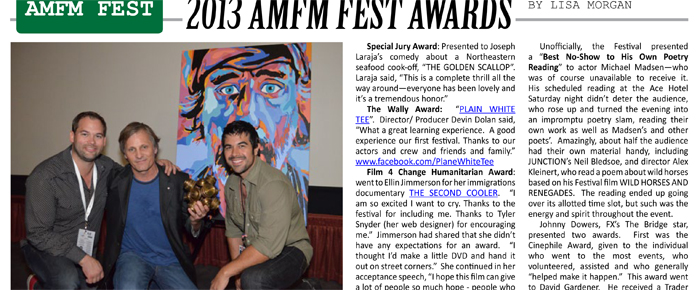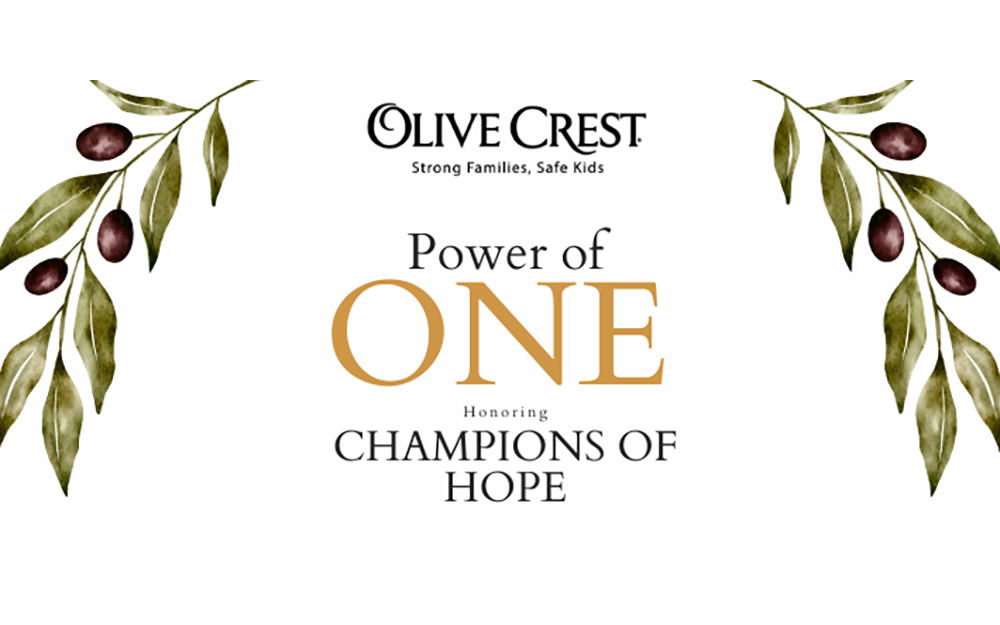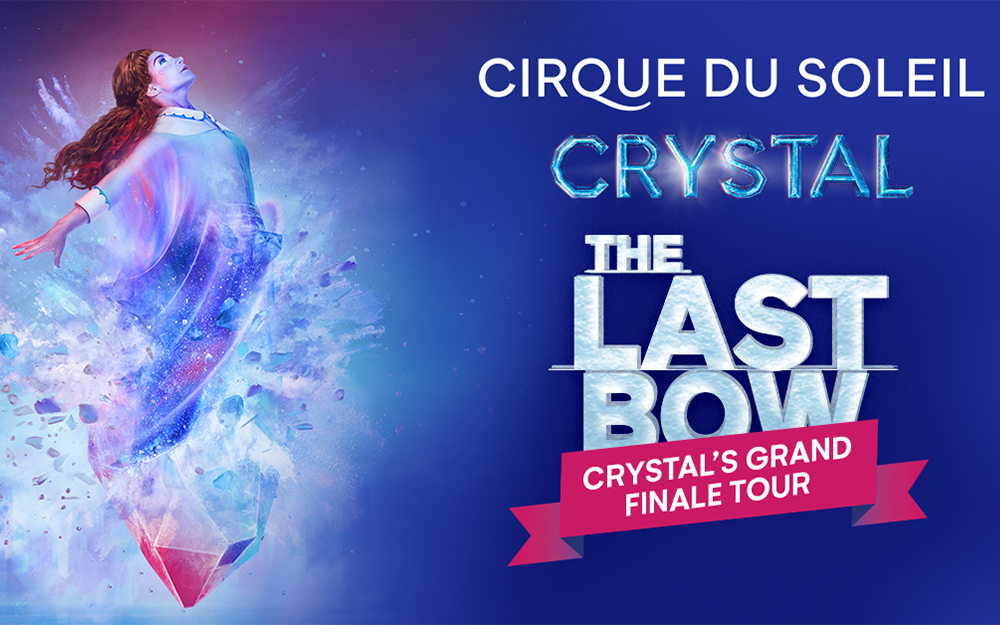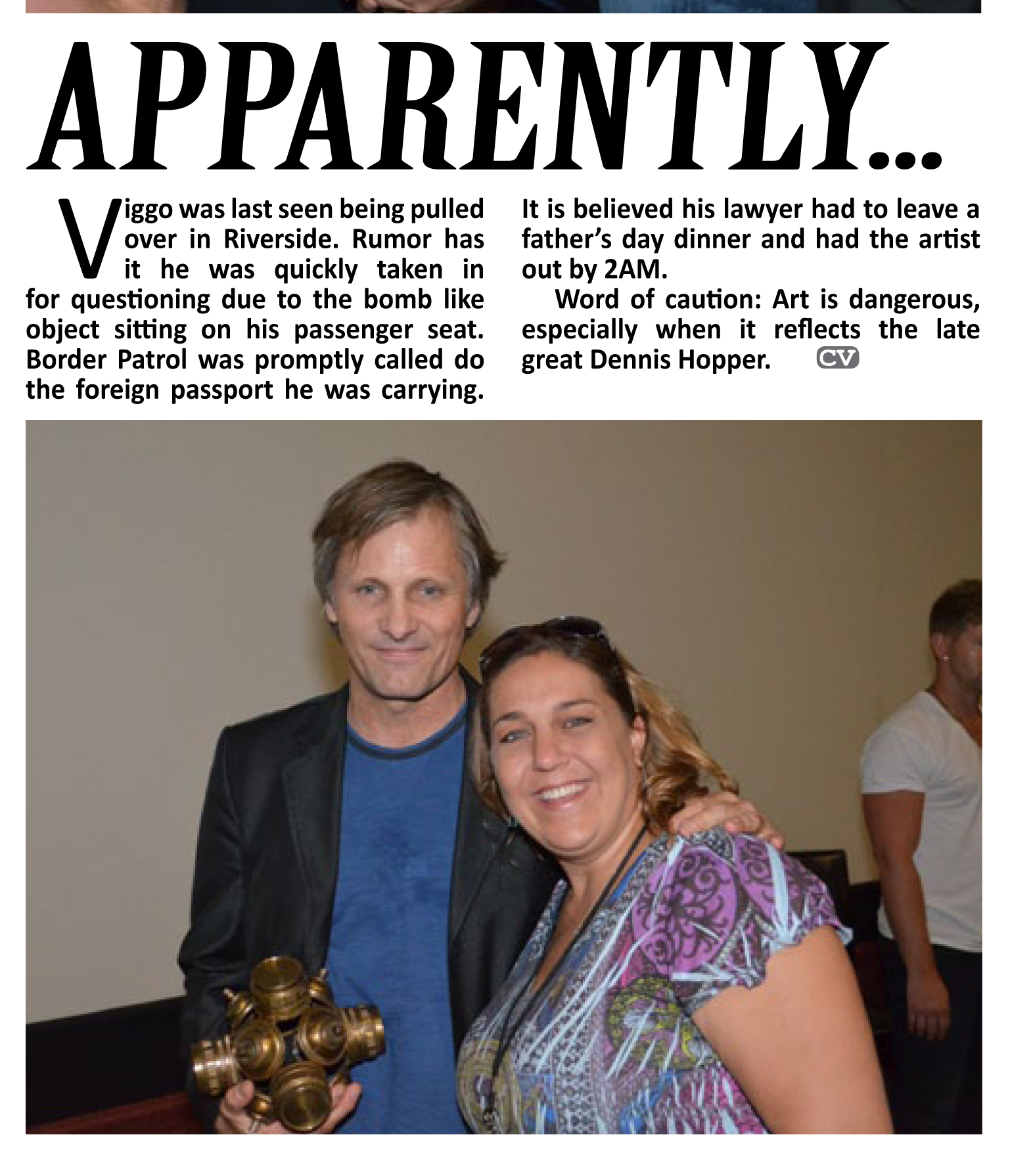
By Lisa Morgan
In an emotionally inspiring and moving ceremony that filled the Buddy Rogers Theater inside the Mary Pickford with artists of all genres and expressions, the first annual AMFM Festival honored the best of the best. Awards given in film, music, photography and poetry were all given in reflection of the inspirational and creative footprint left behind by the late Dennis Hopper, the ultimate of which was presented to Viggo Mortenson.
Festival organizers, Rich Henrich and Rob Galarza of Film 4 Change gave awards in several categories from among the 108 total entries in the festival:
Best Film: Gary King’s film “HOW TO WRITE A JOE SCHERMANN SONG” http://joeschermannsong.com
Best Documentary Award: “AMERICAN ROAD” directed by Kurt Jacobsen and Warren Leming. The film, which “delves into the artistic, musical and literary resonances of the mystique of the road – and especially of veering off the beaten track – in American lore,” made its world premiere at the festival. Accepting the award was Ed Asner who narrated parts of the film. In his iconic voice he said, “I am truly honored they chose it, particularly because it’s in a festival Viggo won an award in, and I am a great admirer of his. As for AMERICAN ROAD, take a lesson from it. It is a beautiful piece of work.” http://americanroad.jigsy.com
Best Feature: Slamdance Award winner, “JOY DE V”, by Nadia Szold. http://www.joydevmovie.com
Best Short: Jason Guy McLagan’s “ELEGY FOR EDEN”, which also screened at Slamdance. “As the Darkness comes for ‘Atom’ (the creature who lives inside and operates the pixel), his perception of the natural world, obscured through the computational lens of the screen, refocuses, and he begins to experience life outside his binary cell.
Best Music Video: “LONELEY”, by Alethea Root for the artist Azhia. She said, “I really won an award? Thanks y’all, it was locally produced and shot here in the desert.”
Best Director: Tony Glazer, director of JUNCTION, which also world premiered at the Festival. He said, “Thanks for the honor of this award and for having the film in this festival; this is everything indie filmmakers want to be a part of. They say it takes a village. Well, it takes a small nation army to make a film and I am indebted to them—the actors, the crew, and even the financiers. This film would not be what it is without their involvement.”
Best Short Documentary: “WE WIN OR WE DIE” by Matthew Millan. He remarked, “Thanks for having us. Thanks to the Libyan people and to my own stupidity for going there. People are still suffering there in Benghazi and that’s what this is all about.” http://www.wewinorwedie.com
Special Jury Award: Presented to Joseph Laraja’s comedy about a Northeastern seafood cook-off, “THE GOLDEN SCALLOP”. Laraja said, “This is a complete thrill all the way around—everyone has been lovely and it’s a tremendous honor.”
The Wally Award: “PLAIN WHITE TEE”. Director/ Producer Devin Dolan said, “What a great learning experience. A good experience our first festival. Thanks to our actors and crew and friends and family.” https://www.facebook.com/PlaneWhiteTee
Film 4 Change Humanitarian Award: went to Ellin Jimmerson for her immigrations documentary THE SECOND COOLER. “I am so excited I want to cry. Thanks to the festival for including me. Thanks to Tyler Snyder (her web designer) for encouraging me.” Jimmerson had shared that she didn’t have any expectations for an award. “I thought I’d make a little DVD and hand it out on street corners.” She continued in her acceptance speech, “I hope this film can give a lot of people so much hope – people who are waiting to make that crossing, people who have been deported, and hope to those that have had to follow their deported loved ones into exile.” http://thesecondcooler.com.
Unofficially, the Festival presented a “Best No-Show to His Own Poetry Reading” to actor Michael Madsen—who was of course unavailable to receive it. His scheduled reading at the Ace Hotel Saturday night didn’t deter the audience, who rose up and turned the evening into an impromptu poetry slam, reading their own work as well as Madsen’s and other poets’. Amazingly, about half the audience had their own material handy, including JUNCTION’s Neil Bledsoe, and director Alex Kleinert, who read a poem about wild horses based on his Festival film WILD HORSES AND RENEGADES. The reading ended up going over its allotted time slot, but such was the energy and spirit throughout the event.
Johnny Dowers, FX’s The Bridge star, presented two awards. First was the Cinephile Award, given to the individual who went to the most events, who volunteered, assisted and who generally “helped make it happen.” This award went to David Gardener. He received a Trader Joes bag full of inidentifiable items. He joyously exclaimed, “I Got Swag!” Followed by, “I have no idea what I am doing up here but I am happy about it.”
Film 4 Change Photographer of the Year Award: Craig Semetko. Henrich said of Semetko, “His work captures moments in the American spirit. Wherever he goes in the world, his lens follows it and captures it.” Semetko in turn thanked the organizers and encouraged all in attendance, “Be true to yourself and remember that kernel of passion that started you on your path to creativity. Keep that thing that fed your soul to begin with. Be authentic.”
Dennis Lee Hopper Award: Viggo Mortensen, the fourth artist to receive the Film 4 Change award that embraces the spirit of Hopper and the Festival’s motto: “Hip, Cool, Funny, Strange, Social Change”
“We are a community of artists committed to having pride in what we do, and dedicated to making our country great through artistic and creative innovation,” Henrich said.
Viggo, who admitted being more nervous from this presentation than he would be for the Nobel Peace Prize, accepted it humbly, graciously and eloquently. He spoke of his longtime friend. “Dennis Hopper is not generally considered to have been a recluse or a hermit. Even during his periods of self-imposed isolation and heavy substance abuse some four decades ago in Taos, New Mexico, he often managed to share his moments of creativity, and of wild excess, with friends and strangers alike. I think it is safe to say that he was socially active by nature, always curious about people, about the way they think and create. He was never too far from the life of the party. However, he always emphasized, even at the end of his life, that to be an engaged and conscious artist is to be essentially alone. To express honestly what they see, hear, and feel artists have to seek out their particular individuality, regardless of what others may think of them or their work.”
“Artists need to come to terms with their personal fear of death and the other mysteries that we all eventually face,” he continued. “That doesn’t mean that any of us have to go around brooding and cursing our fate. On the contrary; the absurd side of being alive, for however long and for whatever reason we are, can be the source of joy if we allow it to be. Fear and the absurdity of being afraid of what cannot be understood was part of Dennis’ everyday life and, in some way, of all his conversations and observations that I was witness to. His regular fits of in-your-face cackling and unrestrained laughter were as important as weapons against darkness and loneliness as any of his cameras, words, or colors. The joke was always on him, always on all of us, he constantly seemed to be saying and celebrating. To be a serious artist, you’ve got to be able to take a joke, to look for one, to be one. There is a lot to be worried about in the world these days, as there always has been and always will be, but everything is possible when you can laugh in life, laugh at and for yourself and everyone else.”
Mortensen closed his acceptance speech to the audiences’ pin-drop silence, as they hung on every word of what was to be the events most powerful reading: “A couple of months before Dennis died; he was recognized with a star on Hollywood Boulevard. On that occasion, I tried to honor the fearlessness and honesty that he inspired in others by reading a short poem by William Stafford, a very wise writer from Dennis’ native Kansas. I offer it to you, and to Dennis, again now:
‘There is a country to cross you will
find in the corner of your eye, in
the quick slip of your foot–air far
down, a snap that might have caught.
And maybe for you, for me, a high, passing
voice that finds its way by being’










































